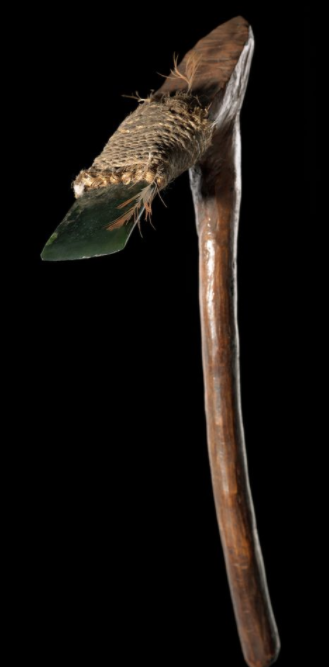Maori
songs - Kiwi songs
- Home
This song
re-enacts the felling and hauling of
logs to build huge voyaging waka,
but it is not a work song. It is
used metaphorically by speakers on
marae to create enthusiatic support
for a major communal undertaking. It
is derived from successive
ancient versions of Toia
Tainui Tapotu.
|
|
Tōia!
Tōia mai rā a Tainui, Te Arawa, Mātaatua,
ngā waka o te motu!
Ma wai e tō?
Māku e tō; ma Whakapau e tō!
Tēnei hoki rā te rangonga ake nei,
He tārewa i nuku,
he tārewa i rangi.
Tūnui ē, nau mai, nau mai,
Nau mai; ka kau téua
i te awa i Pikopiko-i-whiti
Kia mātakitakitia tāua e te tini,
e te mano. |
Haul!
Haul Tainui, Te Arawa, or
Mataatua,
the waka of the island!
Who will haul it?
Haul for me; haul it for One-who-gives-all!
Especially after hearing of this,
a tree
towering up from the earth,
towering up in the sky.
Tall One, come forward, come forward,
Come forward; the two of us will enter
the channel of Pikopiko-i-whiti
To be gazed upon by the hosts of people,
by the multitudes! |
Whakapau - an
example of Chinese whispers here . In the
oldest version it is whakaranga (set it in motion),
then whakarongo (listen), whakatau (decide) and next
Te Whakatau. Compare.
Tūnui is the great tree that is to be felled,
split and adzed to make the keel of one hull of a
voyaging waka. Earlier versions have tinia
(blocked), punia (stuck), punui (punga roller???).
Pikopiko-i-whiti (-o-whitīki)
was "a place on the coast, where the sea was
always smooth." This can only describe a
coral lagoon, and this was an old name
for part of the eastern peninsula of Tahiti. The
name means ‘the enclosed ins-and-outs,’ referring
to the coast line. Whare
Wānanga
Nāku
koe i tiki atu
i te Wao-nui-a-Tāne
Mihimihi e Tāne,
kohakoha e Tāne.
Turuturu haere ana mai te wai
o te hika o Marama.
|
It
was I who went to fetch you
from Tane’s great forest.
Greetings, oh Tane,
You are to be reduced in size, oh Tane.
The water is dripping
from Marama's womanhood.
|
Kohakoha e Tane - the trunk of the tree
is being addressed here. Fires and chipping of the
charcoal are going to reduce it in size. But all the
earlier versions of this chant use Koakoa e Tane, Be
happy Tane!
Marama - When
Tainui arrived on the east coast at Tamaki, an
attempt was made to portage it to the west coast.
The men hauled on the ropes, but the vessel could
not be moved. Finally the tohunga, Rakataura,
discovered that this was because Marama, a wife of
the captain, had broken tapu by having an affair
with a crew member. Necessary rituals were performed
and the vessel glided forward when the crew pulled
on the ropes again. This line refers to evidence of
Marama's guilt.
E
patua ana mai e te kōmurimuri
Nā runga ana mai o Waihī
Ko te iringa mai tēnā o ngā waka
nei.
Arara, huhura te rā,
wewero te rā,
Ngā tāngata i whakariri
ka mamau ki te taura
Kia tūmatatorohia atu e ahau
- taku timatatoro.
Ihu o waka turuki, turuki,
Paneke, paneke!
Haramai te toki,
Haumi ē, hui ē, taiki ē! |
Blown
around by the gentle breeze
that comes from over Waihi
Now resting on
rollers are these waka.
Behold, the sun rises,
the sun shoots out its beams,
The aroused people
grasp the rope
so it can be thrust forward by me
- my thrusting!
The bow of the
waka moves, moves.
Forward! Forward!
Bring the adze,
Gather, unite, bind together! |
 Grasp the rope
Grasp the rope - the message in this old
chant is repeated when a speaker on the marae
proposes a major project. "For thousands of years,
our people have completed herculean tasks by proper
planning, good preparation, cooperative effort and
emotional commitment. We can do that again now."
Haramai te toki - An adze with a sharp stone
blade was used for shaping the waka's hull. "Bring
the adze!" - that is, "Give us the tools and let's
get stuck in all together now!" The toki has become
a symbol of strength, determination, and courage in
challenging times.
Haumi ē, hui ē, taiki ē! Everyone joins
in reciting these ancient words of unity.
Published
on NZFS website June 2020
|
|